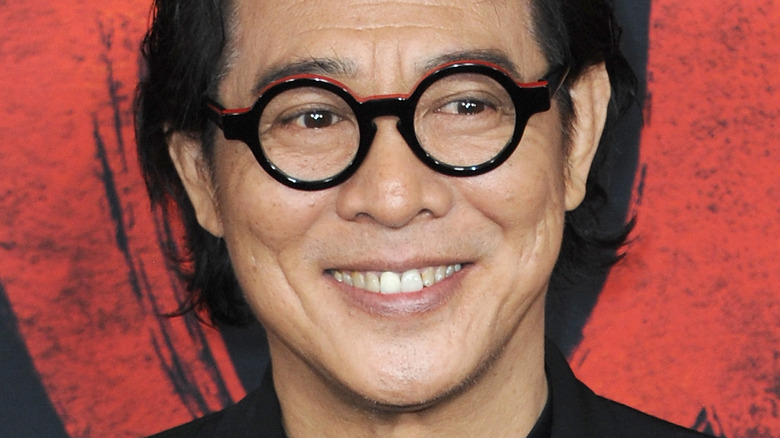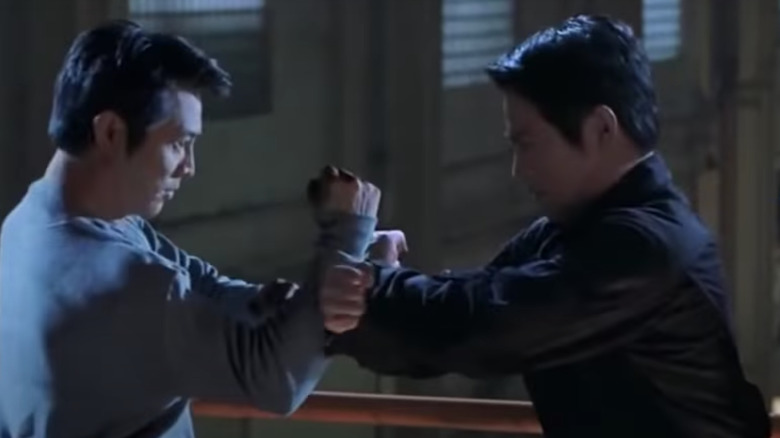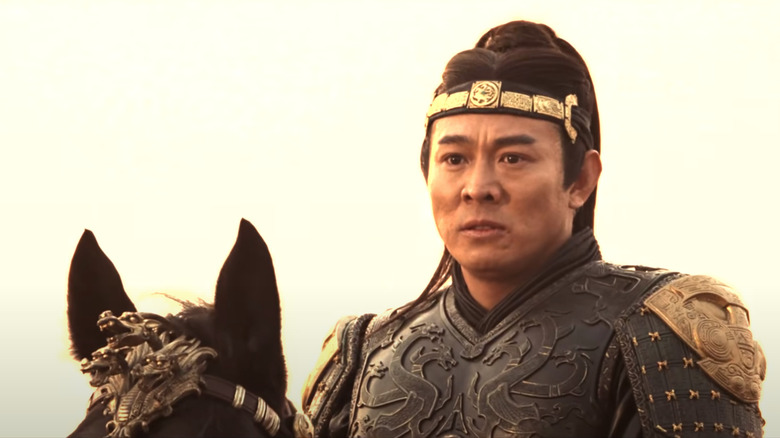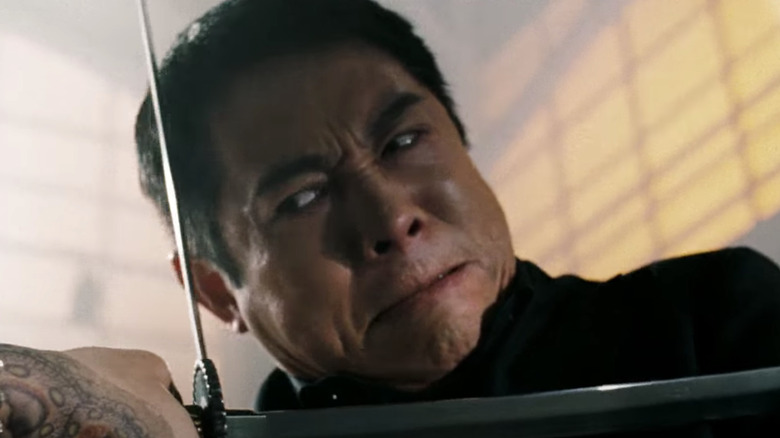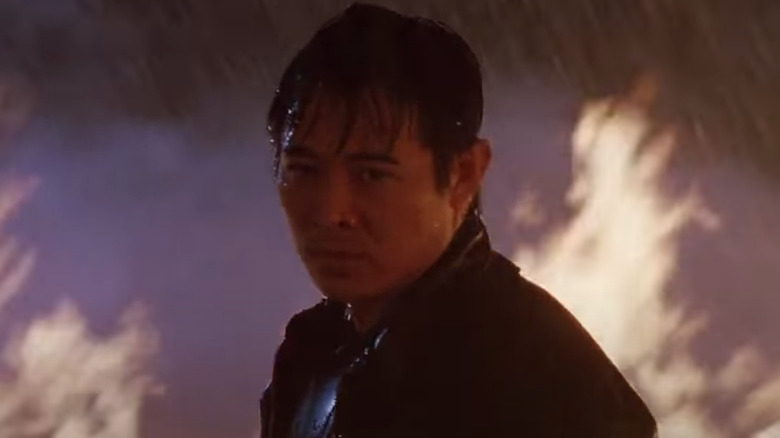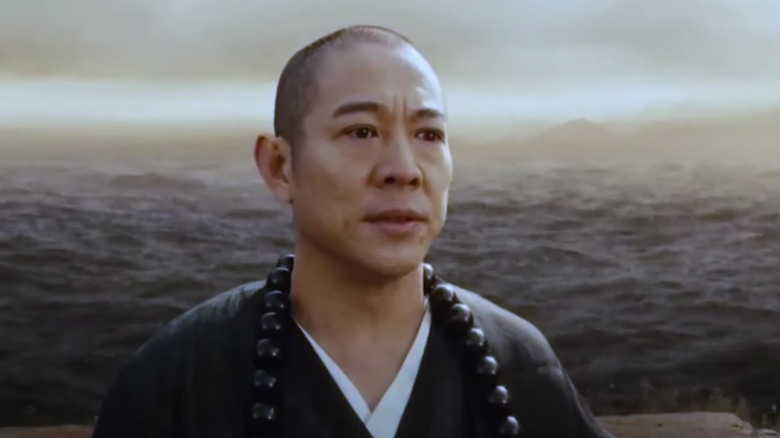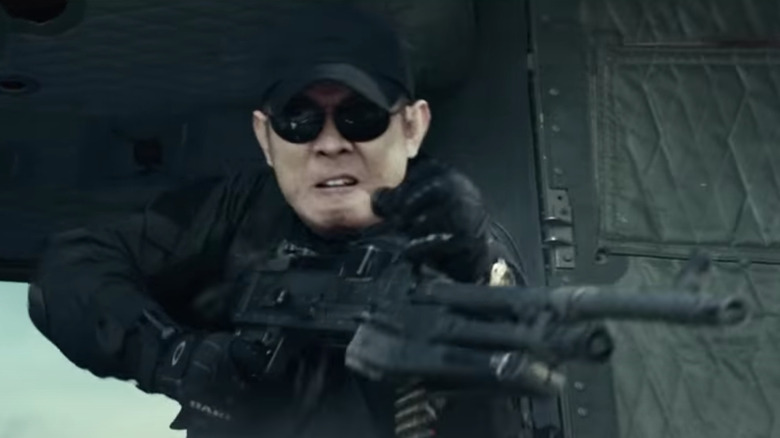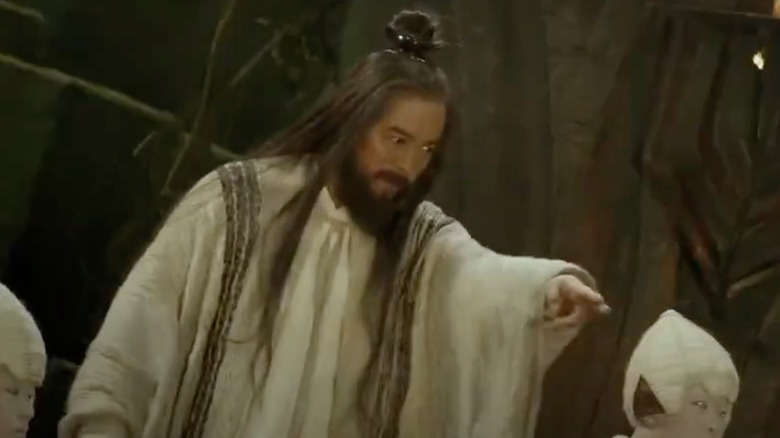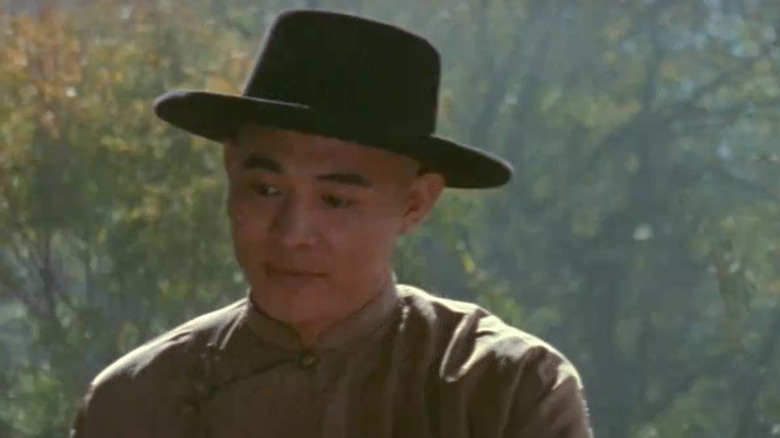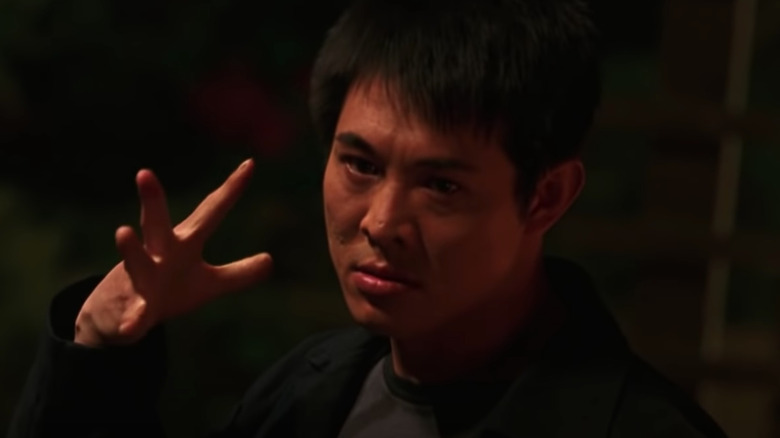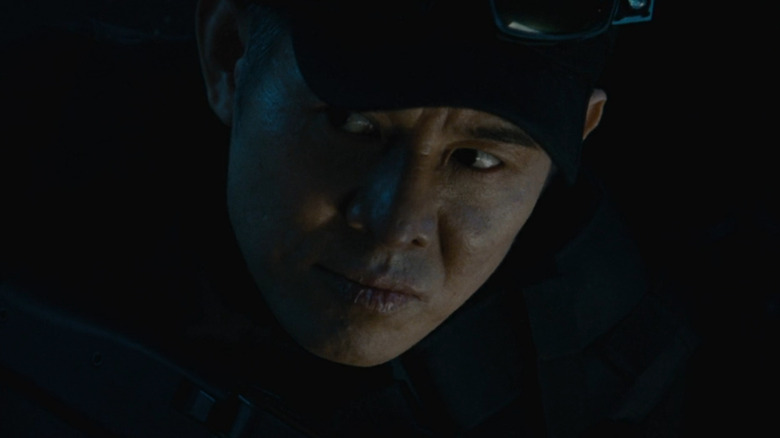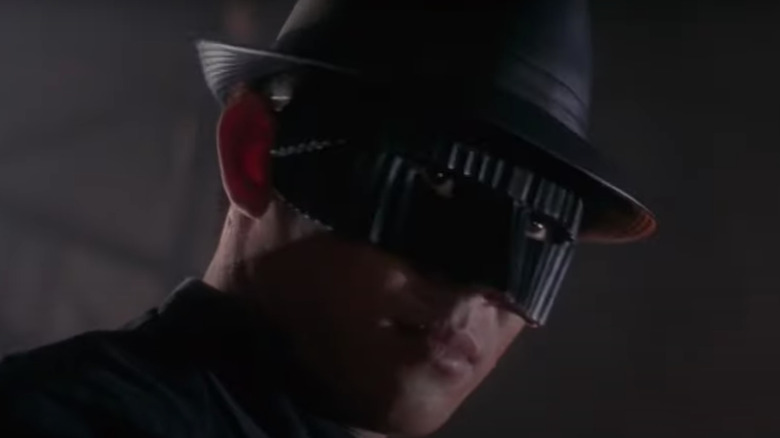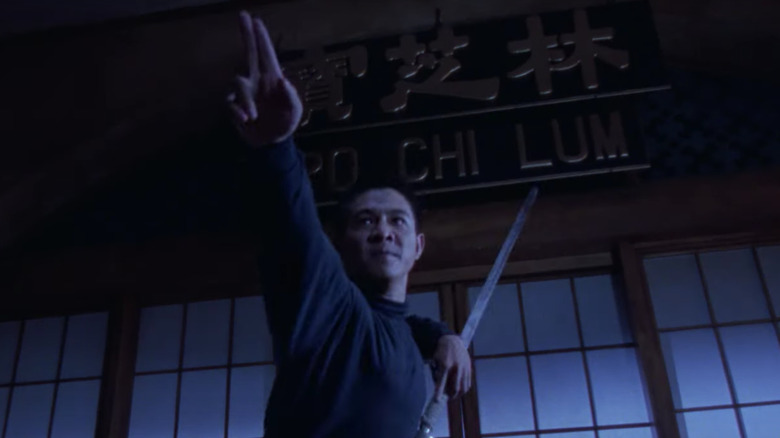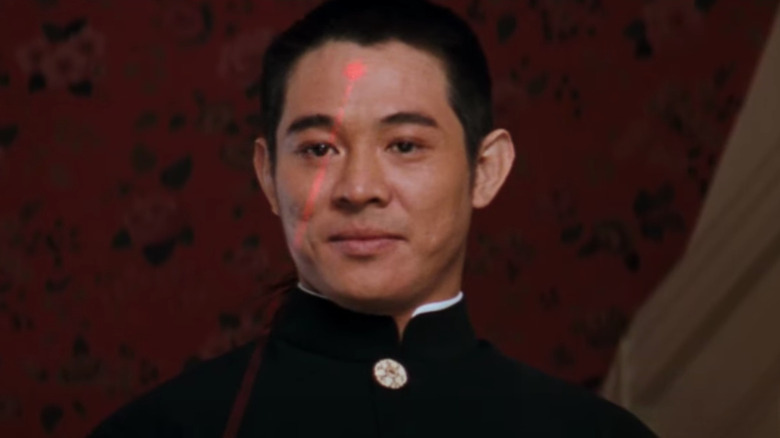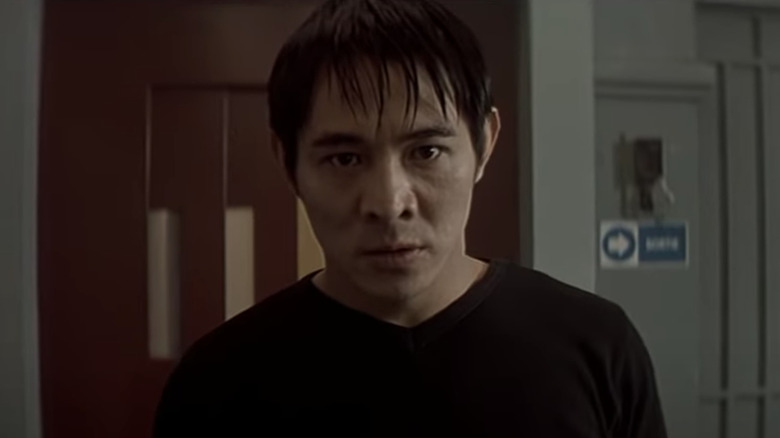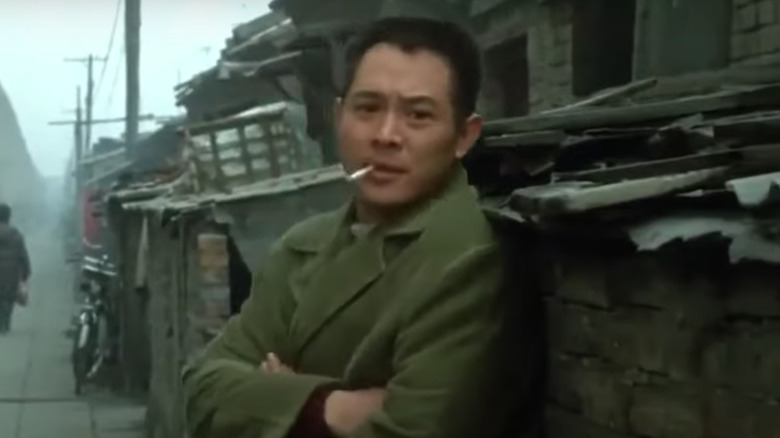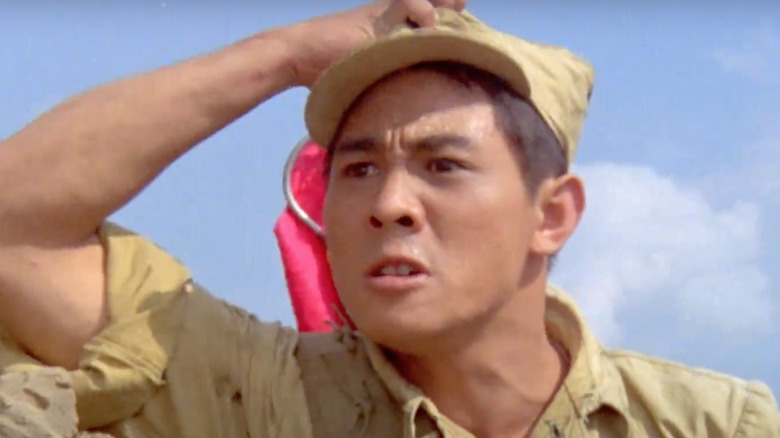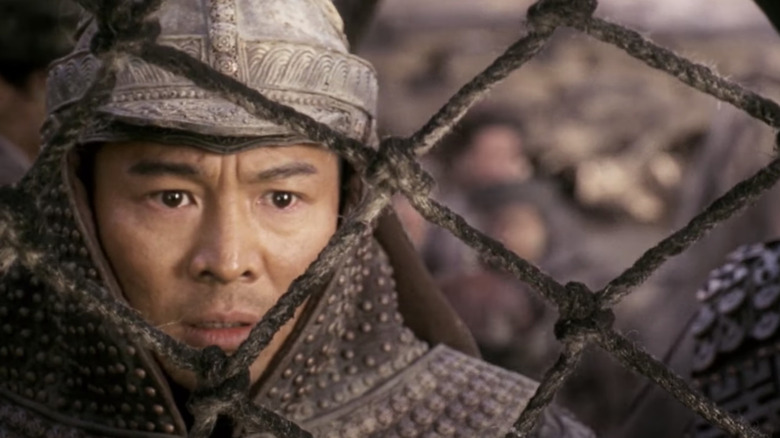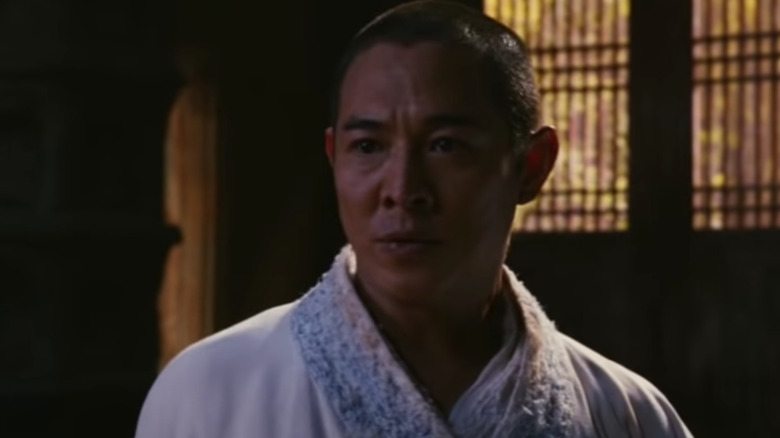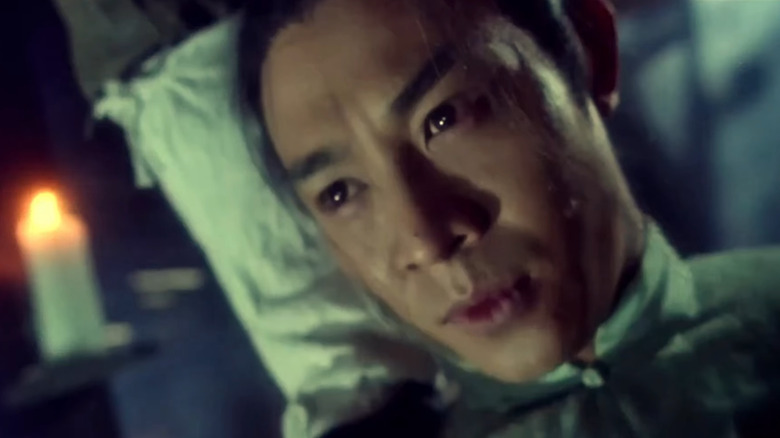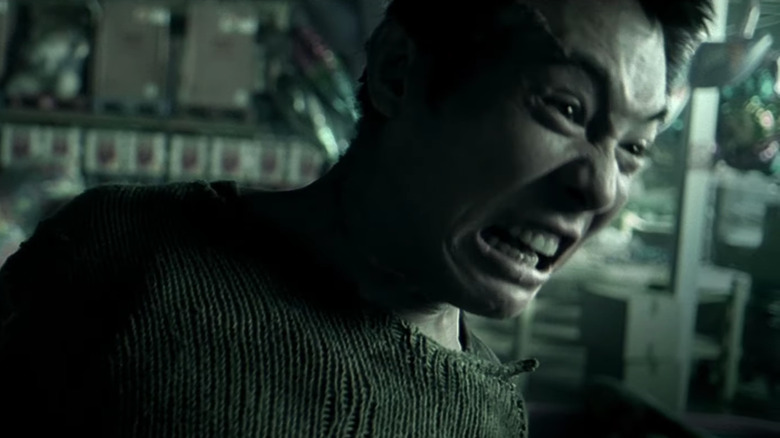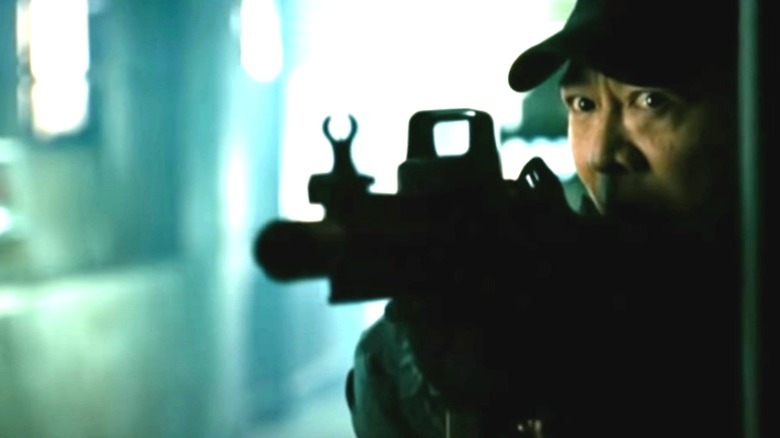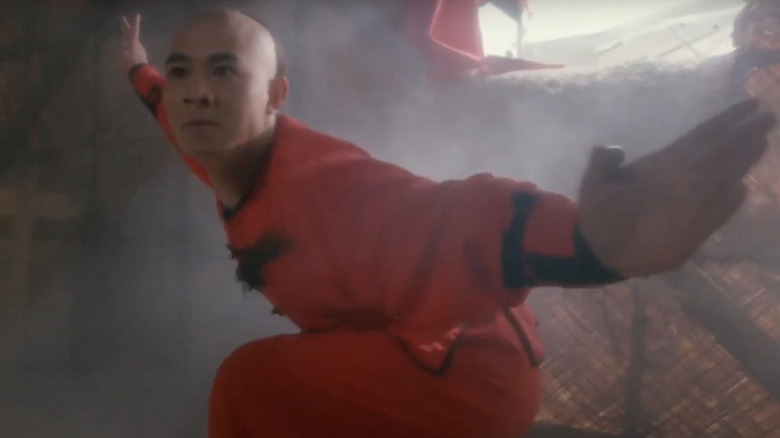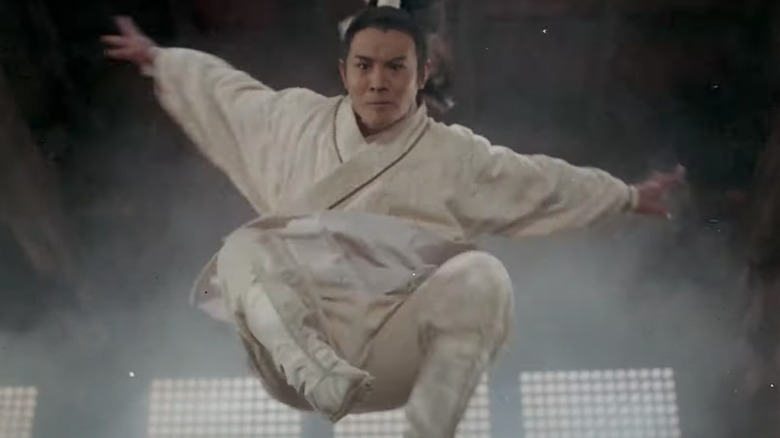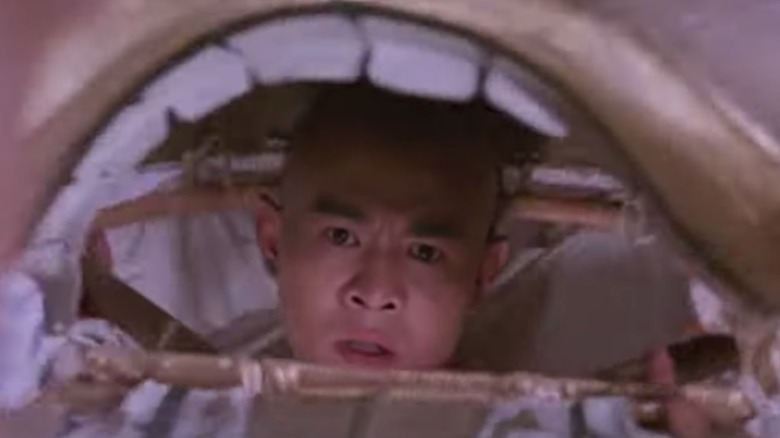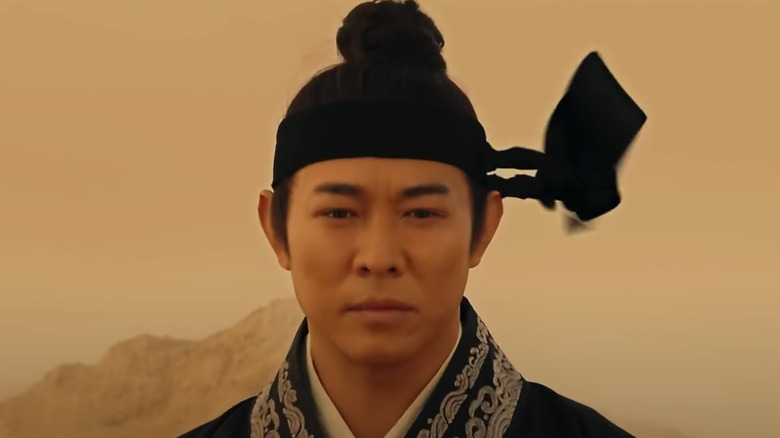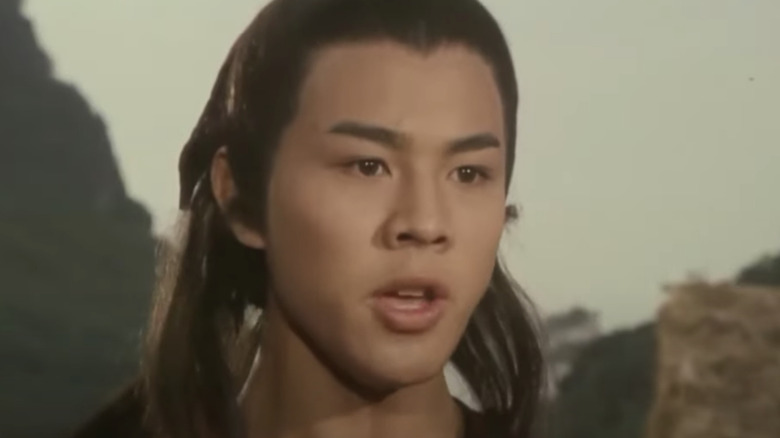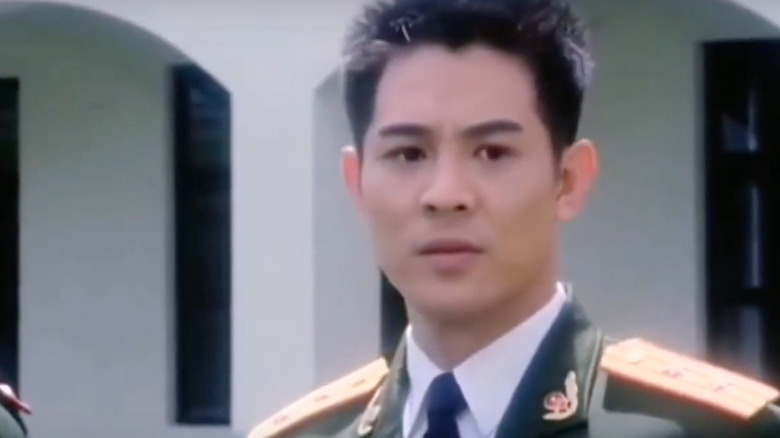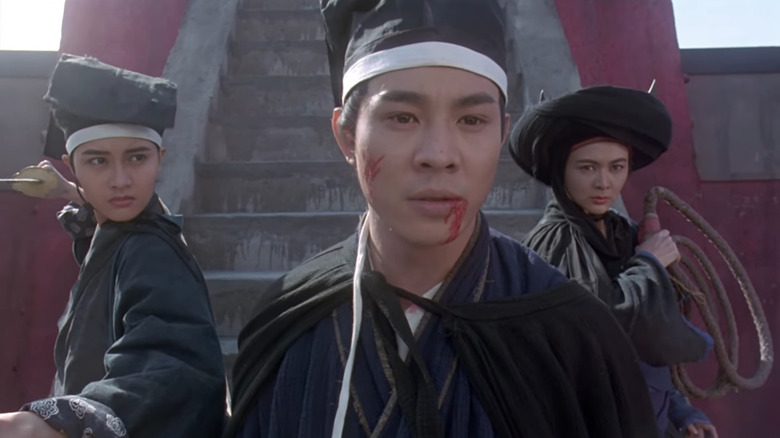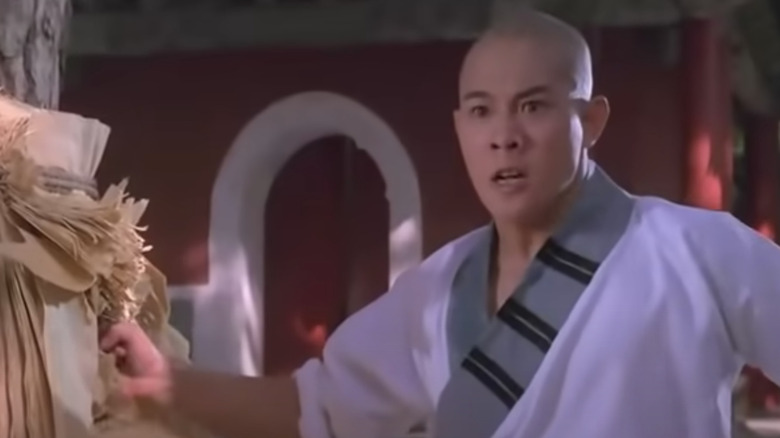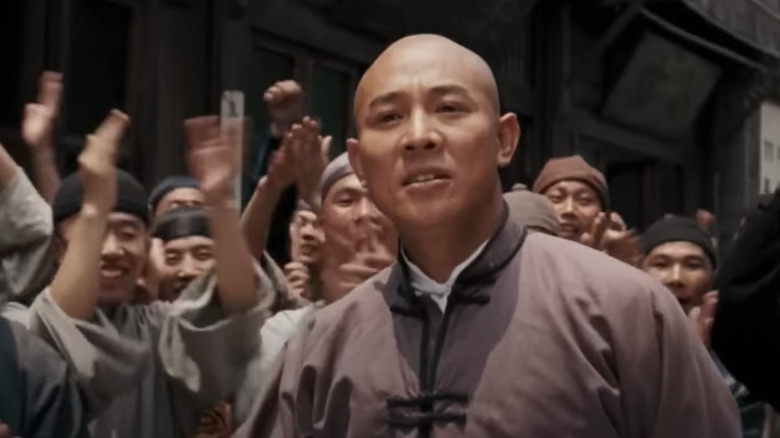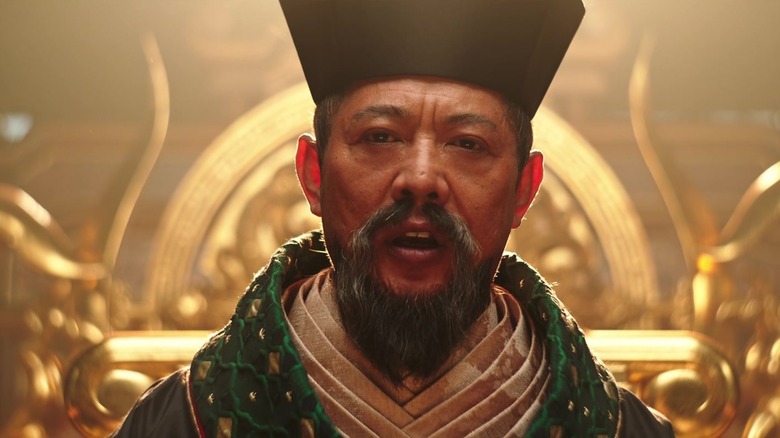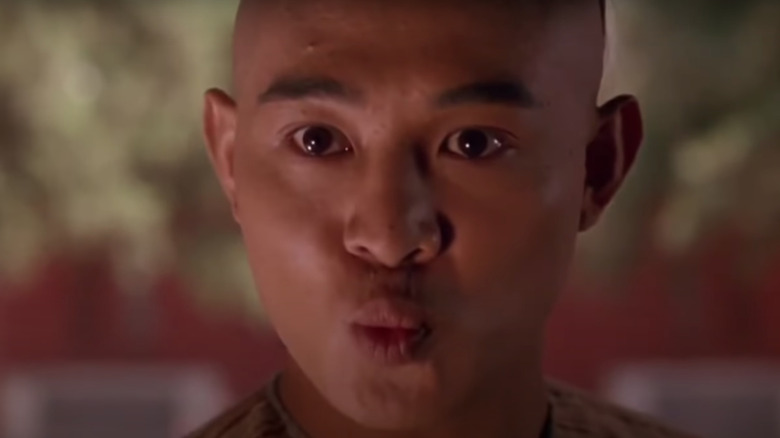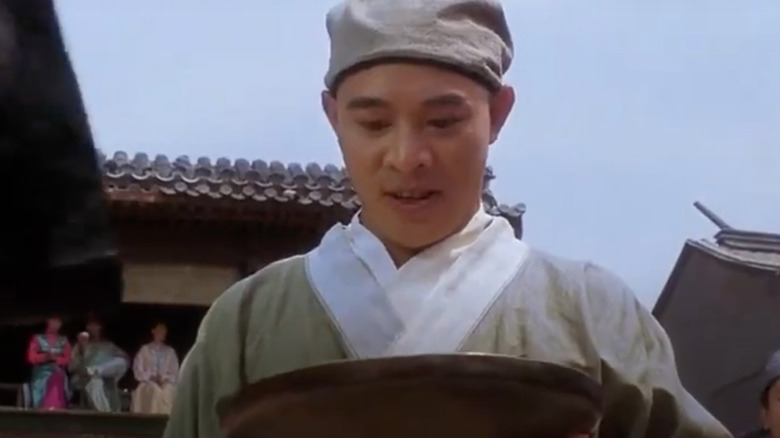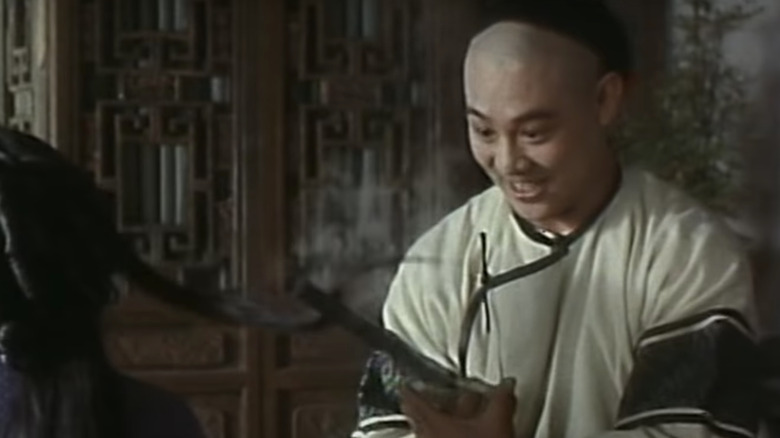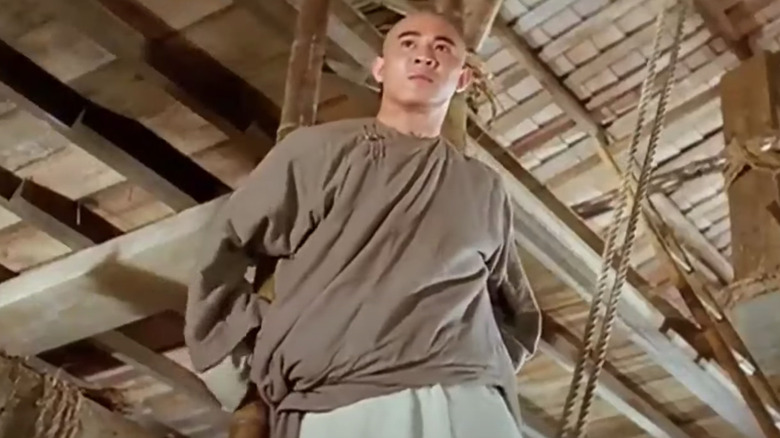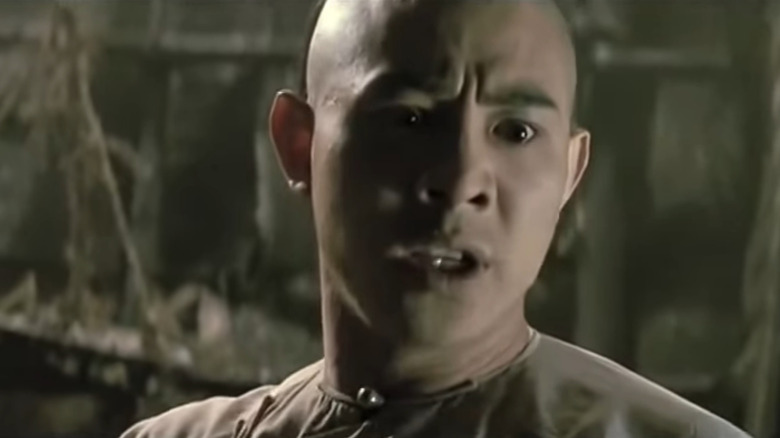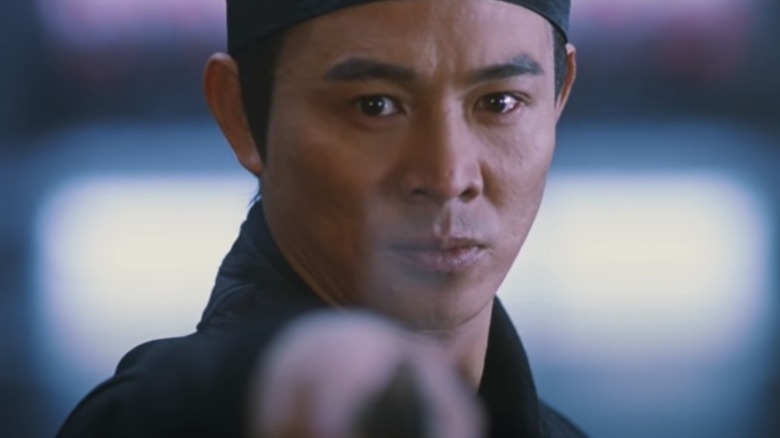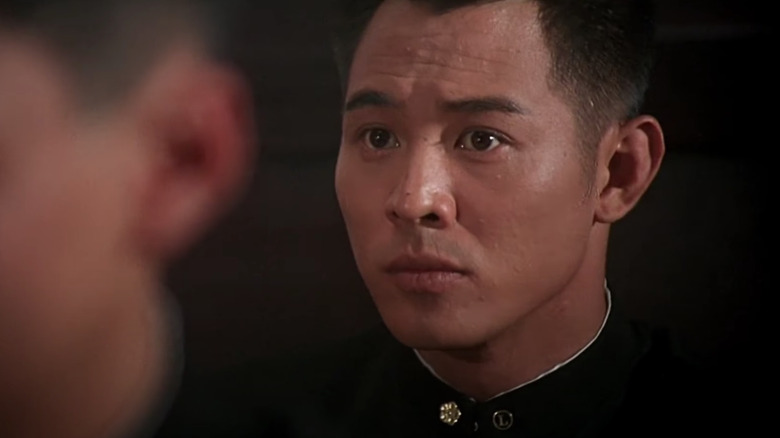Every Jet Li Movie Ranked From Worst To Best
Jet Li, whose real name is Li Lian Jie, is an internationally acclaimed action hero of the silver screen and a world-renowned martial artist. Li earned his first national martial arts championship title by the age of 11 and was headlining Hong Kong action movies before he had even turned 20. After the Beijing-born actor become a massive star in his home country, he managed to successfully transition into becoming a leading man in international productions as well.
Hollywood and other film industries throughout the western world welcomed Li with open arms, embracing his exceptional fighting abilities. Though he has stepped back a bit from filmmaking in recent years, he does still continue to exercise his acting abilities from time to time even as he nears his 60s. The reason for Jet Li's career slowing down over the last decade is unfortunately rooted in his declining health state. The Hollywood Reporter confirmed that Li was suffering from a numbering of ailments, including a heart condition and hyperthyroidism, which accelerates the body's metabolism and interrupts the rhythm of the heart. A career making martial movies has also left Li with a number of long-term physical injuries attained during productions, which have only been exacerbated with age.
Luckily, Li has been able to keep his spirits up despite his declining health. He remains involved in charitable endeavors such as The One Foundation, which he founded in 2007, and continues to make the occasional movie appearance, albeit in less physically demanding roles. From his Hong Kong roots to his Hollywood blockbusters, these are all of Li's major film roles ranked from worst to best based on their Rotten Tomatoes scores.
38. The One
"The One" is a sci-fi action movie from 2001 in which — as in "Everything Everywhere All at Once" and "Doctor Strange in the Multiverse of Madness" — Jet Li plays multiple characters across multiverses. In the wake of the massive success and groundbreaking advancements of "The Matrix" in 1999, many copycats followed over the next couple of years, and "The One" slots snuggly into that category. The movie wears its influences on its sleeve and tries to bring some new ideas to the table but largely falls flat. Its sci-fi storyline follows a single evil iteration of Li as he scours the multiverse in the hopes of eliminating every other version of himself. Each time he kills a particular universe's version of himself, he grows more powerful, and his ultimate goal is to be the unstoppable "The One." It's up to a good version of Li to stop the evil one.
The concept of Li having an epic martial arts battle against himself sounds like a lot of fun on paper but, in execution, "The One" is mostly a joyless affair with bad special effects, a weak grasp on tone, and a convoluted script stripping away the movie's potential. Despite negative critical reception to the film, it went on to gross over $72 million worldwide — not great, but not terrible, it's far from Li's biggest international film.
37. The Mummy: Tomb of the Dragon Emperor
"The Mummy: Tomb of the Dragon Emperor" was the third and final mainline entry in the Brendan Fraser-led "Mummy" series, though a number of spinoff "Scorpion King" films were produced. Brendan Fraser returns in the lead role, with Maria Bello now portraying his wife, a role which was played by Rachel Weisz in the previous two movies. Jet Li plays the titular Dragon Emperor, the main villain of the film, who is resurrected after he and his followers were trapped as the famous Terracotta Army for centuries. Michelle Yeoh co-stars as the immortal sorceress who initially entombed him and returns to help the heroes stop the Dragon Emperor for the final time. It's only one of three films that stars Yeoh and Li and features one of their only fight scenes together.
"Tomb of the Dragon Emperor" arrived following a six-year gap after the release of the first "Scorpion King" spin-off. Perhaps the long wait or the name recognition of Li and Yeoh are what made this "Mummy" movie Li's most profitable film worldwide. This third "Mummy" movie had the potential to revitalize the series, but with largely negative reviews across the board, all it did was bring the "Mummy" franchise as it existed to a final resting place.
36. War
"War" pits two contemporary action stars — Jet Li and Jason Statham — against each other in a violent showdown. Statham plays a tough-as-nails FBI agent who has a personal vendetta against the ultra-effective assassin (Li) who killed his partner. In theory, that sounds like a recipe for an exciting action film, but "War" fails to deliver on what it promises.
The movie features a notable lack of action sequences, and the few that are present are poorly choreographed and filmed with shaky camerawork and choppy editing that makes them difficult to follow. Even more lacking is a proper amount of confrontation between the film's two leads. Top it all off with a terrible plot twist that both makes hardly any sense and undermines everything that came before it, and you have an action flick that is worth skipping even for fans of Statham or Li.
Rotten Tomatoes critics and general audiences all agreed that "War" was a clunky and poorly made affair. In a one-star review for Time Out, critic Ben Walters called the movie "painfully banal" and a "cliché-sodden farrago" while also lamenting the shortage of action and condemning the haphazard editing.
35. Cradle 2 the Grave
The number "2" in the title "Cradle 2 the Grave" might make give you the impression that this movie is a sequel, but that is not the case. This hip-hop-infused action movie from 2003 brought together the odd pairing of martial arts superstar Jet Li and rapper DMX.
DMX plays the leader of a crew of thieves forced to team up with a cage-fighting Taiwanese agent (Li) to rescue his daughter (Paige Hurd), who has been kidnapped and held for ransom in exchange for a collection of rare, black diamonds. "John Wick: Chapter 3 — Parabellum" villain Mark Dacascos and UFC fighters Chuck Liddell, Tito Ortiz, and Randy Couture do much of the fighting, while Tom Arnold, Anthony Anderson, Kelly Hu, Gabrielle Union, and rapper Drag-On comprise the rest of the bizarre cast.
"Cradle 2 the Grave" was directed by Polish cinematographer-turned-director Andrzej Bartkowiak. Both Li and DMX had worked with Bartkowiak separately beforehand on "Romeo Must Die" and "Exit Wounds" respectively. Though he found widespread success as a cinematographer on beloved films by Sidney Lumet, John Huston, and Joel Schumacher, every movie directed by Bartkowiak (including "Doom" and "Street Fighter: The Legend of Chun-Li") was ladened with a "rotten" score from Rotten Tomatoes critics, including "Cradle 2 the Grave."
34. The Sorcerer and the White Snake
"The Sorcerer and the White Snake" is a fantasy wuxia film from 2011 based on an ancient Chinese myth. Raymond Lam plays an herbalist who falls in love with a mysterious temptress played by Shengyi Huang, but the woman is actually a 1,000-year-old snake demon using a mortal form as a disguise. The snake demon attempts to steal the herbalist's soul, but it's up to Jet Li's sorcerer character, Abbot Fahai, to intervene and battle to save him and stop the demon.
"The Sorcerer and the White Snake" plays its fantastical story straight, stuffing its story with ice harpies, bat demons, and enormous serpents, but the film suffered a poor fate at the hands of Rotten Tomatoes critics. Most agreed that the story was over-the-top and that its wuxia elements are diminished by lousy CG fights — there are direct-to-video "Anaconda" sequels with better snake CGI than "The Sorcerer and the White Snake."
33. The Expendables 3
"The Expendables 3" is the latest, most crowded, and lowest-rated entry in the Sylvester Stallone-led action ensemble series thus far, though "Expendables 4" has long been in the works. Arriving two years after the previous entry, "The Expendables 3" reunites most of the core cast from the other two movies and adds in a bunch of new faces, such as Harrison Ford, Wesley Snipes, Antonio Banderas, Kelsey Grammer, Ronda Rousey, and Glen Powell. Jet Li plays Yin Yang (yikes), a hand-to-hand combat expert, throughout the series, yet by the time the third film began shooting, Li's health conditions prevented him from doing many fight scenes. Most of his role finds him in a helicopter using a turret, or walking along a rooftop beside Arnold Schwarzenegger, mowing down nameless baddies.
The third "Expendables" got a particularly sour reception from critics and fans. The cast is overstuffed and mostly wasted and the action is bland and generic, resulting in a film that, per critic Sophie Gilbert with The Atlantic, is "as bloated and 'roid-inflated as its cast." "The Expendables 3" is also noteworthy for being the only entry in the series to be rated PG-13 instead of being rated R — as though an audience of teenagers is going to turn up to watch '80s action stars reunite — and it became the lowest-grossing "Expendables" film to date. The nostalgia value of seeing so many iconic action stars brought together had lost its luster the third time around and the overall movie failed to impress. Though Li has very little to do in the third film, it remains to be seen if he'll stick with the franchise in the future — or even if this franchise has a future.
32. League of Gods
"League of Gods" is one of Jet Li's most recent movies. The 2016 film was a bit of a return to the spotlight for Li in a starring role after his deteriorating health had led to him slowing down his film career a bit (per The Hollywood Reporter). The film is a big-budget adaptation of a classic piece of Chinese literature first published all the back in the year 1560. The novel "Fengshen Yanyi," which is also known as "Investiture of the Gods," is steeped in mythology and packed with fantastical creatures and epic battles.
Fan Bingbing plays the main villain of the film, a malevolent creature who possesses China's King Zhou, played by Tony Ka Fai Leung. Li plays Jiang Ziya, a mystical hero who rides a crane and possesses special powers, such as the ability to stop time. Also of note on the cast are prominent Hong Kong film industry figures like Andy On, Louis Koo, and Xiaoming Huang.
While it isn't rated on Rotten Tomatoes, "League of Gods" is by all accounts a dud. Critics found its CGI distracting and its characters paper-thin. Li doesn't get much to do, and even critics who vaguely liked the film concede that it's more of a guilty pleasure. The film didn't leave much of an impression whatsoever with English-language audiences, who gave it low ratings on Rotten Tomatoes and barely turned out to theaters to watch it, and worse still, it was a bit of a notorious failure in its home country. "League of Gods" was awarded the unwanted title of Most Disappointing Film at the Golden Broom Awards, which is essentially China's version of the Razzies.
31. Once Upon a Time in China and America
Jet Li's sixth and final entry in the long-running "Once Upon a Time in China" series is directed by legendary martial arts actor and filmmaker Sammo Hung and brings Li back to the franchise after a two-movie hiatus. The original "Once Upon a Time in China" arrived early on in Li's career and is arguably the film most responsible for rocketing him to superstardom within the Hong Kong film industry, so it is unfortunate that the very same series would land toward the bottom of his filmography. Not enough Rotten Tomatoes critics have reviewed the film to reach an official consensus and over 5,000 ratings from audiences have left "Once Upon a Time in China and America" with a bottom-of-the-barrel 0% score, so its actual placement among Li's films is up for debate.
Critics agree that it fails to live up to the highs of the other installments, and fans of the first five "China" films really seem to detest this sixth film (via the blog City on Fire). Maybe that has to do with its different setting — the film is a cowboys-and-Native Americans Wild West actioner that goes heavy on the fights and light on plot and character. Derek Elley's Variety review argues, "When Li is onscreen and the stunts are in full flow, the movie is an enjoyable ride, notably in the opening reel with some acrobatic stagecoach shenanigans, Li vs. Xiong [Xinxin] in the middle, and the final face-off between Li and [Joe] Sayah." Yet every review comes with caveats, and even the Criterion Collection release of the franchise snubs this entry, only unceremoniously dropping a 2K release of the film for a special edition. Though it has its fans, "Once Upon a Time in China and America" may not have been worth Li's return to the series that made him a star.
30. Romeo Must Die
"Romeo Must Die" was one of Jet Li's first movies made in Hollywood and is his first movie to earn a "fresh" score from general audiences on Rotten Tomatoes, even though critics still gave it a "rotten" score. As the Romeo of the title implies, "Romeo Must Die" is a modern retelling of the basic "Romeo and Juliet" story, though it changes up the formula drastically.
Hip-hop music and martial arts replace Shakespearean dialogue, a gang war replaces the feuding Capulet and Montague families, and modern-day Oakland, California, replaces 1400s Verona, Italy. Li and singer Aaliyah form the romantic pairing at the center of the movie, though many critics found them to be lacking in chemistry, such as Roger Ebert, who wrote: "No great romantic chemistry is generated between the young lovers, and there is something odd about a martial arts warrior hiding behind a girl's bedroom door so her daddy won't catch him." "Romeo Must Die" was Aaliyah's first movie, and she tragically passed away in a plane crash just one year later at the age of 22.
29. The Expendables
When Sylvester Stallone set out to assemble a roster of action heroes for the first "Expendables" movie, Jet Li had the honor of being the only Asian action star and, in fact, the only action star on the lineup who didn't start his career in American action movies. Alongside Li and Stallone are Jason Statham, Randy Couture, Mickey Rourke, Dolph Lundgren, "Stone Cold" Steve Austin, and Terry Crews, and Arnold Schwarzenegger and Bruce Willis appear for cameos. Every character on Stallone's team has a specialty and a quirk, and Li is the resident hand-to-hand expert who's frequently mocked for being short.
This cavalcade of action stars was the big selling point for "The Expendables," and the movie delivers enough fan service and nostalgia to serve its function well enough for general audiences on Rotten Tomatoes, but critics were tougher to impress. The story of a team of mercenaries sent to overthrow a South American dictator was too simple and the action sequences were too tame and unimpressive according to most critics. Andrea Hubert of NME wrote, "It's difficult not to cringe, albeit nostalgically, at the vast gap between what they're trying to achieve and what they actually manage to accomplish."
28. Black Mask
"Black Mask" is a 1996 superhero action movie made in Hong Kong shortly before Jet Li began his transition into Hollywood filmmaking. The movie is based on a Chinese comic book series called "Black Mask" created by the artist and writer team of Li Chi-tak and Pang Chi-Ming. Li stars as a genetically engineered super-soldier. He was initially part of a super powerful team known as Squad 701 until it was disbanded due to fears of the dangerous side effects related to genetic engineering. When his old squadmates appear to be responsible for a string of murders, it's up to Li to track them down and keep his city safe. He fights crime dressed in a black mask over his eyes and a black hat, not dissimilar to Bruce Lee's iconic Kato.
One of the writers of "Black Mask" was the legendary Hong Kong action maestro Tsui Hark, who also produced the film. Li and Tsui collaborated a number of times together over the years, most notably working as writer/director/producer and star, respectively, of the long-running and extremely successful "Once Upon a Time in China" series. "Black Mask" failed to live up to those heights, however, and it received mixed reviews from critics, unsure of whether a few good Li action scenes made up for the lackluster plot or poor cinematography.
27. The Master
"The Master" was the first time Jet Li starred in a movie set in the United States, though the movie was still a Hong Kong production and featured an entirely Chinese creative team. Li stars as a martial arts practitioner out to defend the honor of his retired master (Wah Yuen) from a murderous ex-student played by American Taekwondo and kickboxing expert Jerry Trimble, who earned the title of Kickboxing Champion of the World in 1986. Li's character is named Jet this time around, similar to how Jackie Chan often played characters named Jackie.
In the first of many major injuries sustained on film sets, Li broke his wrist while shooting "The Master." This certainly complicated the production but didn't prevent Li from getting his fight scenes done. One of Li's most important collaborators, Tsui Hark, was in the director's chair for "The Master" and co-wrote the story as well.
Though the film hasn't enough reviews to earn a rating on Rotten Tomatoes (it has a 50% audience score), critics appear to be mixed on it. Panos Kotzathanasis of Asian Movie Pulse said that Tsui's attempts at social commentary fall flat and that the decision to not give Li any fight scenes for the first hour of the film also doesn't do "The Master" any favors. But in a positive review for Eastern Kicks, Fedor Tot wrote, "Jet Li, whose ['90s] fame came from more morose self-serious roles, struggles a little with some of the comic aspects, but the comedy is so relentless and high-speed that I cackled through most of the film. [...] 'The Master' is an amusingly distorted image of America as seen by Honk Kongers in the '80s — mullets, gangs roaming the streets and rampant testosterone."
26. Lethal Weapon 4
Jet Li made his explosive Hollywood blockbuster debut with "Lethal Weapon 4" in 1998. Mel Gibson and Danny Glover return as Detectives Riggs and Murtaugh, Rene Russo returned as Lorna Cole after joining the series in the third installment, and Joe Pesci also returns as the comic relief character Leo Getz. Li was brought in to play the main villain of the movie, the head of a crew of Chinese gangsters who have it out for the main buddy cop duo.
"Lethal Weapon 4" divided critics and ultimately earned a marginally "Rotten" score on Rotten Tomatoes. Many critics singled out Li as the film's greatest strength, even if they weren't fans of the total package. In a review for Film Threat, critic Ron Wells was lukewarm on the movie but praised Li, writing: "Jet Li ROCKS in the kind of American debut Jackie Chan or Chow Yun-Fat would have killed for." Despite the middling reception, "Lethal Weapon 4" became Li's highest-grossing film in the U.S. and his third-biggest hit worldwide.
Part of what made his U.S. debut work so well was the fact that it was under a talented director — "Superman" and "The Goonies" filmmaker Richard Donner — and that Li was still working under the guidance of a frequent Hong Kong collaborator, Corey Yuen, who served as the martial arts fight choreographer on "Lethal Weapon 4." Corey Yuen and Li previously worked together on movies like "The Master," "The Defender," and "The Legend," amongst many others.
25. Kiss of the Dragon
"Kiss of the Dragon" was one of Jet Li's first English-language movies. Unlike his earlier American productions "Romeo Must Die" and "Lethal Weapon 4," "Kiss of the Dragon" is set in Paris, France. Li stars as a Chinese police officer visiting Paris on the job where he is framed for the assassination of a Chinese drug lord (Ric Young) by ruthless French criminals led by a corrupt police inspector (Turkish actor Tchéky Karyo). Li must exercise his cunning and martial arts abilities to clear his name and take revenge on the criminal who set him up. The "Kiss of the Dragon" title refers to a pressure-point execution technique that causes the victim to bleed from every orifice before expiring.
Bridget Fonda co-stars as an American tourist who has been forced into prostitution and drug addiction by the same man who framed Li's main character. Amongst the numerous adversaries Li faces off against, the most memorable are the blonde-haired twins played by the duo of the nimble Cyril Raffaelli and the brutish Didier Zoulay. Raffaelli is better known as a stuntman, fight choreographer, and action director with expertise in both martial arts and parkour, and his fight against Li is the clear highlight of the film. "Kiss of the Dragon" is also notable amongst Li's filmography for being the only movie in which he received a "story by" credit.
The film has an undeniable Hollywood flair to it, due to the involvement of Luc Besson as writer and producer. The French director helmed ambitious action films like "Léon: The Professional" and "The Fifth Element" and also worked with Li on "Unleashed," but Besson was also accused of sexual assault in 2018 (via BBC News). Critics were divided on "Kiss of the Dragon."
24. My Father Is a Hero
"My Father Is a Hero," which is also known in the U.S. as "The Enforcer" and "Jet Li's The Enforcer," is a 1995 Hong Kong action movie from director Corey Yuen, Jet Li's frequent collaborator, who would go on to choreograph martial arts for Li in "War" and "The Expendables" among other projects. Yuen also choreographed stunts for the Jason Statham movie "Wild Card" and directed Statham in 2002's "The Transporter." Here, he directs Li in a run-of-the-mill Hong Kong actioner starring Li as (what else?) an undercover cop. Ten-year-old martial artist Miao Xie gets to kick butt as Johnny Ku Kung, Li's character's son. Two years earlier, Miao Xie also played Li's son in the movie "Legend of the Red Dragon." After growing up, Xie continued acting in martial arts movies, even taking on the legendary role of Ip Man in 2021's prequel "Ip Man: The Awakening."
"My Father Is a Hero," however, does not rank among Li's strongest work in the 1990s, earning middling reviews. The film is among the first to see Li taking a modern role rather than the period wuxia films he traditionally starred in. Joey O'Bryan with The Austin Chronicle noted that the film has several strong and memorable fight scenes and benefits from the father-son dynamic of Li and Xie but that its script is at times unbearably weak, suffering from "soap-opera melodramatics" and a stilted plot.
23. Born to Defense
"Born to Defense" was one of the first movies of Jet Li's acting career. This somewhat awkwardly translated title is also known as "Born to Defend," "Final Fight," and "Nameless Soldiers." Li plays a soldier who faces relentless racism from American soldiers in the immediate aftermath of World War II. In addition to war-based action sequences, "Born to Defense" also features martial arts fights and numerous boxing matches, making for quite a lot of variety in the types of action on display.
This marked the first time that Li played a character named "Jet" on screen, and he had previously been credited as "Lianjie Li" beginning with his first performance in the movie "Shaolin Temple." Interestingly, Li also choreographed the fights in "Born to Defense" and served as the director of this early movie effort. He did not choreograph the fights in any of his other movies, nor has he ever directed another film.
Evaluating Li's sole directorial effort's reputation is a bit of a challenge, as the film doesn't have an official rating on Rotten Tomatoes. JJ Bona with City on Fire offered lukewarm praise of the film, saying that it's too cartoonish and sparse to make a great first impression of Li behind the camera but also that the fight scenes and some of the social commentary make "Born to Defense" age better than some of his other films. J. Doyle Wallis with DVD Talk called the film a "worthy curiosity" for fans of Li. LP Hugo of Asian Film Strike echoed criticisms of Li as a director but praised his choreography: "As a choreographer, [Li] acquits himself much better, staging down-to-earth, bone-crunching, [English] boxing-inspired fights which he executes with all the awe-inspiring speed and precision of his prime. But that is the only redeeming feature in a film that is both cheesy and bitter, a bad combination indeed."
22. The Warlords
Set in the 1800s during the Qing Dynasty, the true story of the Taiping Rebellion serves as the basis for the fictionalized plot of "The Warlords." This war epic brings together a trio of notable names within the Hong Kong film industry: Jet Li, Andy Lau (from "Infernal Affairs," "Shock Wave," and "Shock Wave 2"), and Takeshi Kaneshiro (of "Red Cliff" and "House of Flying Daggers" fame). Li plays a skilled general who is left as the only survivor of his battalion after a rebel ambush leaves the Qing army massacred. Lau and Kaneshiro play the two leaders of a large group of bandits who strike a blood oath with Li's general character, and the trio works together to fight the rebels and bring stability to the region.
Though it didn't completely blow many critics away, most found the film to be worthwhile based primarily on the strength of its three leads and the mastery of its grand battle sequences. (This is the first of his films in this ranking to have a "Fresh" critic and audience score.) Jeannette Catsoulis with The New York Times gave "Warlords" a positive review, writing that the film "heaves with spectacular battles" and that "Jet Li delivers a magnificently shaded performance." Despite not ranking among his best films, "The Warlords" earned Li the most awards and nominations of his career, with Best Actor nominations at the Asian Film Awards, Golden Horse Film Festival, Hong Kong Film Critics Society Awards, and Hundred Flowers Awards. Li took home a Shanghai Film Critics Award and Hong Kong Film Award for his performance.
21. The Forbidden Kingdom
"The Forbidden Kingdom" finally delivered on an action star pairing for which martial arts fans had been begging for years. This was the movie that brought together two of the Hong Kong film industry's biggest stars: Jet Li and Jackie Chan. The pair would only appear in one additional film together, 2009's "The Founding of a Republic," a zhuxuanlu or propaganda film depicting the events leading up to the founding of the People's Republic of China, which featured Li, Chan, and Hong Kong superstars Donnie Yen and Andy Lau in small cameo roles. "The Forbidden Kingdom" not only puts these two icons side by side, but it also allows them to square off in a fight for the ages.
The umpteenth adaptation of "Journey to the West," "The Forbidden Kingdom" takes an approach more likely to appeal to American audiences. It adopts something of a "white savior" premise, following an American teenager (Michael Angarano) who's spirited back to ancient China by a magical staff a la "A Connecticut Yankee in King Arthur's Court" and has to help an immortal, Lu Yan (Jackie Chan, in full "Drunken Master" mode), battle a warlord (Collin Chou). Li pulls double duty as a Silent Monk and as the legendary Monkey King.
Though the fight between Li and Chan is one of the film's highlights, the 2008 project might prove too silly for some unfamiliar with wuxia films, or too clumsy and anglicized for devoted wuxia fans. The American writer and director may not be points in the film's favor, either, but they don't affect the action too much, which is reliably choreographed by Hong Kong legend Yuen Woo-ping, director of "Drunken Master" and a director and choreographer for many of Chan's and Li's films. Critics and audiences generally were able to look past the film's heightened tone and unlikely protagonist and appreciate the entertaining fight scenes.
20. Legend of the Red Dragon
"Legend of the Red Dragon," a martial arts action-comedy hybrid, is also known as "New Legend of Shaolin," "Hung Hei-Koon: Shaolin's Five Founders," "Master of Shaolin," and "Legend of the Future Shaolin." The film first united Jet Li and Miao Xie as a father-and-son duo traveling around China intent on vanquishing any and all forces of evil, be they man or monster. This is a period piece, though the duo would play similar roles in the present day in "My Father Is a Hero" the following year.
The action scenes in "Legend of the Red Dragon" stand out from similar action movies in that they are played more for laughs rather than for thrills and utilize a technique that was dubbed "fast-motion kung fu." "Legend of the Red Dragon" was written and directed by Jing Wong, who has a reputation for being one of the Hong Kong film industry's most prolific directors. He has made 120 movies over the course of his 40-year filmmaking career, four of which star Li.
Though the film has no official rating on Rotten Tomatoes, it has attracted its fair share of praise. "In a movie dominated by swords, spears and wirework, [the] action never stops," wrote Joseph Stannard for Kung-Fu Kingdom. "Highly entertaining and perhaps overly theatric, the battle scenes are incredibly impressive and superbly choreographed, especially when [Li] and [Xie] team up." David Rooney of Variety was effusive in his praise, writing that the fight scenes are top-notch and nonstop. He praised the film's "reckless pace," writing, "The series of showdowns gradually gains momentum, building to a rip-roaring finale replete with a vat of bubbling oil in a Hitchcockian clock tower."
19. Unleashed
"Unleashed" is undoubtedly one of Jet Li's best English-language movies. Set in Glasgow, Scotland, with a Chinese, American, and British cast and made by a primarily French behind-the-scenes team, "Unleashed" is a true international production. It provides Li with a role to express a deeper level of emotion largely without dialogue, which helps navigate the language barrier for this English-language film. Li plays a vicious fighter who serves as the attack dog for a gangster (Bob Hoskins), who took control of him when he was a child and has raised him to know nothing but violence. Physically, Li's character is a skilled and brutal thug, but mentally and emotionally, he is still just a child. Morgan Freeman and Kerry Condon play two everyday people who take Li in and nurture his innocent side when he tries to escape from his life of slavery and violence, but his gangster master won't let his best soldier go without a fight.
The movie was written and produced by Luc Besson, the French filmmaker behind movies like "Léon: The Professional," "Nikita," and "The Fifth Element," and was directed by Louis Leterrier, the French filmmaker who also directed the first two "Transporter" movies, "The Incredible Hulk," and "Now You See Me." But Li wasn't the only Hong Kong action master involved in the film. The legendary Yuen Woo-Ping was brought on as the fight choreographer after handling the action for movies like "Crouching Tiger, Hidden Dragon," "The Matrix," "Kill Bill," "Iron Monkey," and countless others. Li is pitch-perfect in "Unleashed," earning good reviews. "'Unleashed' suffers from a surfeit of sentimentality at times (blame Besson for that)," wrote Marc Savlov for The Austin Chronicle, "but it's Li's first major Western role of any depth and he acquits himself admirably as both mad dog and melancholy master."
18. The Expendables 2
The second movie in the "Expendables" series is the highest-rated of the current trilogy on Rotten Tomatoes as well as its highest-grossing installment. This sequel had a stronger grasp of its cheesy tone, upped the bloodshed, and added a plot rather than a string of fight scenes, and most importantly, it improved the overall quality of the action sequences. The entire core cast from the first movie returned, and Bruce Willis and Arnold Schwarzenegger both had their previous cameo appearances expanded into full roles. New faces on the cast this time around included Chuck Norris, Liam Hemsworth, Scott Adkins, Nan Yu, and Jean-Claude Van Damme as the new villain, whose name is literally "Jean Vilain," as though anybody watches these films for the writing.
The story of the sequel begins much the same as the previous movie, with the crew of mercenaries being sent on a dangerous mission at the behest of Willis' CIA character. The key difference is that this time, the Expendables are out for revenge after Vilain kills one of their own (Luke Hemsworth) and gets his hands on Soviet-era plutonium.
Jet Li's presence in "The Expendables 2" was initially supposed to be much larger, and he was almost acting opposite fellow Hong Kong martial artist Donnie Yen. According to the South China Morning Post, the film was originally planned to be an American and Chinese co-production with a large chunk of the action set in China. After studio negotiations fell apart, the script was hastily rewritten to change the setting from China to Bulgaria. Suffering as collateral damage, Donnie Yen's role was written out of the movie, and Li's role was drastically reduced, with his character now parachuting straight out of the movie after the opening act. Li by this time wasn't in the best health, but he manages a fun gun-and-frying pan fight in the opening anyway. Though this is his second-highest-grossing film worldwide, it's also potentially the entry on this list with the least Li to go around.
17. Last Hero in China
"Last Hero in China" is a classic martial arts comedy co-directed by Jing Wong and Yuen Woo-Ping, both of whom are legends of the Hong Kong action film industry and have worked with Jet Li several times over the years. Li reprises the character he is arguably best known for in Hong Kong, the real figure of the folk hero Wong Fei-Hung, who is often labeled as the Chinese Robin Hood.
One of Li's biggest recurring movie roles was as Wong Fei-Hung in the "Once Upon a Time in China" movie series. Released in between the third and fourth movies in the "Once Upon a Time in China" series, "Last Hero in China" is a non-canonical semi-spinoff of that larger series from different creators, but it adopts a much goofier and more comedic tone as opposed to the often heavy and serious mainline entries. Li left the "Once Upon a Time in China" series after the third film due to a contract dispute with the producing studio, Golden Harvest (per Criterion). Li made "Last Hero in China" instead of starring in "Once Upon a Time in China IV," and the results earned a positive response on Rotten Tomatoes. Andrew Saroch, writing for Far East Films, said, "Seeing Jet Li play his Wong Fei Hung role straight among a cast who are clearly playing to the outrageous parts of the script is quite confusing to watch." But he praised the sleek action and minimal wirework — otherwise a staple in Li's films — and ultimately said that "Last Hero in China" is an at times absurd yet thoroughly enjoyable showcase for Li's talents as a martial artist.
16. Kung Fu Cult Master
1993's "Kung Fu Cult Master" is a zany fantasy-comedy-action movie with an over-the-top style and tons of magic and superpowered abilities like flight, flame manipulation, electrocuting jungle vines, and a hysterically laughing monk who rolls around on the surface of a giant boulder. The story is set during the Yuen Dynasty and follows many good and evil cults of martial artists as they all vie for control of a pair of golden swords said to contain the power to dominate all opponents.
Alongside Jet Li are many notable Hong Kong film industry regulars such as Sammo Hung, Collin Chou, and Francis Ng, amongst others. Although the movie didn't make too much of an impression upon its initial release, the story has made a major resurgence in recent years. The film's director, Jing Wong, returned nearly 30 years later to reboot the property with "New Kung Fu Cult Master" starring Donnie Yen, and a sequel, "New Kung Fu Cult Master 2," which both released in 2022.
Though it has a 72% audience score on Rotten Tomatoes, the film has no critic score, and many of the reviews published on "Kung Fu Cult Master" are not very positive. Joey O'Bryan wrote for The Austin Chronicle, "Director Wong Jing [...] is notorious for working without a finished script and, while it often charges his work with a kind of loony spontaneity, here it serves only to drive viewers into maddening fits of frustration, as they vainly attempt to comprehend a senseless story that the director is probably making up as he goes along." Love HK Film's review succinctly calls the film "fast, furious, frenetic, and fundamentally forgettable."
15. One Upon a Time in China III
The third entry in the "Once Upon a Time in China" series wasn't met with quite the same level of acclaim as the first two movies in the series but was still generally well-received by critics and general audiences. This outing continues to follow the adventures of Jet Li's Wong Fei-Hung character, who is based on the real Chinese folk hero. The story finds Wong fighting to keep his father (Lau Shun) safe from gangs, entering a high-stakes dance contest, and competing against a Russian diplomat (John Wakefield) to woo a woman (Rosamund Kwan).
Just like the last previous two movies, this third installment was written and directed by action maestro Tsui Hark. "III" marked the exit from the series for Li and Tsui in the director's chair, though Tsui remained involved with the franchise as writer and producer. Critics largely agree that this third time around suffered from a notable step down in quality but that it is still a worthwhile film. Some also consider the third outing to be the most visually impressive despite having a weakened story. Panos Kotzathanasis wrote for Asian Movie Pulse, "The third part of the trilogy may be in a slightly lower level than the first two, but is still a very good wuxia film." He went on to say it's "the most personal film of the trilogy, as his father is introduced and plays a significant part in the narrative, and also the most impressive, in visual terms."
14. Flying Swords of Dragon Gate
"Flying Swords of Dragon Gate" is a 2011 half-remake, half-sequel of the original story of the Taiwanese wuxia film "Dragon Gate Inn" from 1967, which had already been remade in Hong Kong as "New Dragon Gate Inn" featuring Donnie Yen in 1992. Both are critically acclaimed, and the original is considered a cornerstone film of the genre (via Empire). This Ming Dynasty-set story features marauders, pirates, disappearances, political manipulation, and a search for a mythical lost city that is supposedly buried beneath the desert. Jet Li stars as the freedom fighter protagonist, leading a cast that also features the likes of "Ip Man" star Siu-wong Fan, Chinese television star Kun Chen, and "Perhaps Love" actress and singer Xun Zhou.
"Flying Swords of Dragon Gate" was the last of eight collaborations between Li and Tsui Hark to date. Critics enjoyed the film more than general audiences but were still critical of the scattershot plot by and large. A three-star review in The Guardian by Steve Rose summarized, "With all the double-crosses, lookalikes and hidden agendas, things get mighty confusing, but the action is ludicrously epic, amping up the old-school combat with superhuman powers, bizarre weaponry and comically overzealous computer effects. It's nonsense, but somehow irresistible."
13. Kids from Shaolin
"Kids from Shaolin" is the middle film in what is commonly known as "The Shaolin Trilogy" or "The Shaolin Temple Trilogy." The other movies in the series are "Martial Arts of Shaolin" and "Shaolin Temple," the latter of which was Jet Li's first movie (despite being available to stream, it doesn't have a Rotten Tomatoes rating and thus is ineligible for the ranking). Li was just 16 years old when he was scouted to play the lead in "The Shaolin Trilogy." He had never acted before but had already earned acclaim for his martial arts abilities as a star athlete on the National Wushu Team of China (per Den of Geek). The story of "Kids from Shaolin" uses a familiar "Romeo and Juliet" setup — just like Li's later "Romeo Must Die" — and centers around a romance and rivalry between two families who live on opposite sides of a river and practice different martial arts disciplines: Shaolin vs. Wu Tang. The two families are forced into an alliance when a gang of bandits attacks their homes.
The film has a 70% audience score on Rotten Tomatoes but no critic reviews. Most of the writing on "Kids from Shaolin" seems to be mixed or tepid praise. Den of Geek's Craig Lines compared it to a Disney movie, or a Chinese take on "Seven Brides for Seven Brothers." Andrew Skeates from Far East Films wrote that the film is "equal parts goofy, exciting and tedious" but enjoyed the 20-minute action scene at the end. Glen Stanway for Kung-fu Kingdom praised the film's use of real-life wushu champions — it's said director Hsin-Yen Chang thought it'd be easier to teach fighters to act rather than actors to fight — but Stanway also criticized the film's action and choreography compared to the original film. Those drawbacks are possibly a consequence of rushing a sequel into production after the runaway success of "Shaolin Temple" and the rapidly rising star of Li.
12. The Defender
"The Defender," also known as "The Bodyguard from Beijing," is a 1994 action romance movie that sought to cash in on the buzz of the highly successful Hollywood movie "The Bodyguard" from two years earlier with Kevin Costner and Whitney Houston. Though not explicitly a remake, "The Bodyguard from Beijing" features essentially the same story, only with more action and without the music element. Christy Chung plays the witness to a murder, while Jet Li plays the bodyguard assigned to protect her, and the two fall in love while navigating dangerous situations.
In the director's chair for "The Defender" was Corey Yuen, who also directed Li in the "Fong Sai-Yuk" movies and "My Father Is a Hero." The few Rotten Tomatoes critics who covered the movie sang the praises of Li's charisma and the effective romantic chemistry between him and Christy Chung. TV Guide wrote positively about Li's romantic turn, saying, "Li exudes enough magnetism to make the sexual banter with his fair damsel credible, and enough athletic prowess to simultaneously power this and several other vehicles."
11. The Legend of the Swordsman
"Swordsman II," also known as "The Legend of the Swordsman," is a fantasy action film from 1992. Though it mostly functions as a self-contained story, it's a sequel to 1990's "The Swordsman," which confusingly does not start Jet Li. Instead, the character was played by Samuel Hui, who took the role back from Li for 1993's "Swordsman III: The East Is Red." Jet Li stars as Linghu Chong, who decides to retire to a quiet life of self-imposed exile up in the mountains. Before leaving for good, he stops by for one last visit with his magical warrior-women friends, who have harnessed snakes to use as weapons. Upon arriving, he finds their village ransacked and helps the survivors seek vengeance, all the while trying to stop a cult from overthrowing the Ming Empire.
The entire trilogy was directed by stunt coordinator and action director Siu-Tung Ching, who would go on to be an action director for Li's "Hero" and action coordinator on other Li films "The Warlords" and "The Sorcerer and the White Snake." The overarching plotline for the "Swordsman" saga was adapted from the eight-volume epic novel "Proud Smiling Wanderer" written by Jin Yong.
"Swordsman II" has a 79% audience rating on Rotten Tomatoes but no critic score. That's not to say it wasn't reviewed — critics with The Austin Chronicle and the blog Opus thought the film was a messy, run-of-the-mill "swords and sorcery" epic that distracts you with "thrill-a-minute" pacing. More positively, though, David Chew with Asian Movie Pulse wrote that Li's "Swordsman" entry "is a highly recommended wuxia movie populated with interesting colorful characters, beautiful costume, breakneck action and a catchy theme song." Calvin McMillin of Love HK Film called it a "must-see of the genre" and one of the best wuxia sequels out there, responsible in part for revitalizing a genre that may have had only a few kicks left in it were it not for Li.
10. Martial Arts of Shaolin
"Martial Arts of Shaolin" is the third and final movie in the "Shaolin Temple Trilogy" that launched Jet Li's movie career. The film ups the scale of the fights and by setting the action sequences in gorgeous locales, including the Forbidden City and the Great Wall of China. The largest action sequences of the film are noteworthy for featuring over 100 martial artists all fighting simultaneously in extreme wide shots. The film is produced by Shaw Brothers Studio, the famous Chinese martial arts film production company.
Li stars as a young Shaolin Monk who plots to assassinate the Qing Dynasty magistrate who killed his family. Unbeknownst to him, a second assassination attempt happens at the exact same time, and the confusion leads to the would-be target surviving and getting the upper hand. Li teams up with the two other would-be assassins, played by Huang Qiuyan and Hu Jianqiang, to evade the magistrate's guards and regroup to plot a successful assassination. Though it is the third film in the "Shaolin Temple Trilogy," the story is self-contained and the cast of characters is entirely different from film to film despite Li starring in all three. "Martial Arts of Shaolin" is also commonly known by the alternate title "North and South Shaolin."
The film has a 72% audience score on Rotten Tomatoes but no critic score. Reviews of the film outside of the aggregator site are uniformly glowing, with critics with Far East Films and Kung-fu Kingdom highlighting the film's larger budget and visual spectacle. "After about 30 minutes of training sequences, the excellently-choreographed battles kick in and rarely let up," summarized City on Fire in a review.
9. Fearless
Between making the English-language films "Unleashed" and "War," Jet Li returned to China to produce and star in "Fearless," which is also known as "Jet Li's Fearless." The film takes its title from the Lao Tzu quote: "Mastering others is strength. Mastering oneself makes you fearless," which outlines the arc undergone by Li's main character. The film takes place between the late 1800s and the early 1900s and tells the mostly true life story of Huo Yuanjia, a martial arts master who became China's most famous competition fighter by besting any and all challengers both foreign and domestic in hand-to-hand and sword combat matches. Huo went on to found the influential Chin Woo martial arts school, which later expanded into a chain of schools and became the Chin Woo Athletic Association.
"Fearless" was advertised as Li's last Wushu movie, and the film was the penultimate picture from director Ronny Yu, who followed a similar career trajectory to Li. Both made names for themselves in the Hong Kong film industry and successfully transitioned into careers in Hollywood. Rather than sticking to action, Ronny Yu left his biggest impression in Hollywood in the horror genre, helming "Bride of Chucky" and "Freddy vs. Jason" before returning to Hong Kong to make "Fearless." Li earned high praise for his part, including a slew of award nominations at the Chinese Film Media Awards, Hong Kong Film Awards, Hundred Flowers Awards, and Teen Choice Awards and winning a Hong Kong Film Critics Society Award.
8. Mulan (2020)
There is a chance that Disney's live-action "Mulan" remake may be one of Jet Li's final movies, if not his last. When asked by USA Today why he agreed to appear in "Mulan" after a four-year hiatus from the big screen, Li said that he has simply much pickier about which roles he takes on and that it was his daughter's love of the original animated "Mulan" from 1998 that convinced him to take on the part.
Li plays the role of the Emperor who rules China and shapes the titular character's worldview. Fellow Hong Kong martial arts superstar Donnie Yen also plays a key role in the film, and the titular Mulan is played by Liu Yifei, who previously co-starred with Li in "The Forbidden Kingdom" in 2008. Much was changed when remaking the animated film, such as ditching the talking dragon sidekick Mushu voiced by Eddie Murphy, removing the musical numbers, and employing a far more serious and grounded tone.
This live-action remake was released during the first year of the COVID-19 pandemic on Disney+ domestically and in theaters internationally, resulting in poor box office performance. The film earned back less than half of its gargantuan $200 million budget, pulling in just under $70 million worldwide. Rotten Tomatoes critics gave the movie the highly sought-after "Certified Fresh" badge.
7. The Legend of Fong Sai-Yuk 2
1993's "The Legend of Fong Sai-Yuk 2" is a sequel to "The Legend," released earlier that same year. The films were shot back to back (via The Spinning Image). Jet Li produced both of "The Legend" movies and plays the titular role of Fong Sai-Yuk. Under the direction of frequent collaborator Corey Yuen, Li reprises his Fong Sai-Yuk role and goes out on another action-packed adventure that finds him engaging in espionage, romancing his fiancée, and competing in a high-stakes martial arts competition.
There is some debate over whether or not Fong Sai-Yuk was a real person, but his mythic legend has achieved folk hero status in China. The South China Morning Post credits Li's portrayal of Fong Sai-Yuk for turning the figure into a household name even though the figure had previously been portrayed in several earlier movies, including well-known kung-fu movies like the Shaw Brothers "36th Chamber of Shaolin" series.
The film enjoys a 75% audience rating on Rotten Tomatoes but has no critic score. Critics generally agree that the film is a Hong Kong action triumph that also unfortunately has its shortcomings. Marc Savlov wrote with The Austin Chronicle that the director "keeps the action swift (but then, has there been a Hong Kong film of late where the action wasn't rushing along like a runaway train?), peppering it with various complex stunts and set pieces (the final battle for the mother's life atop a pyramid of ladders and tables is a marvel of barely visible wiring)." Fong Sai-Yuk continues to be the subject of Chinese adventure films to this day with movies like "Fong Sai-Yuk the Beginning," released in 2020.
6. Tai Chi Master
"Tai Chi Master" is a 1993 martial arts movie that paired up two legends of the Hong Kong action film industry while they were still both early on in their careers. Jet Li and Michelle Yeoh star as a disgraced Shaolin monk and a rebel fighter, respectively. When his best friend and fellow expelled monk (Chin Siu Ho) joins up with a corrupt government official (Sun Jian-kui) and stabs him in the back, Li is nursed back to health and trained by Michelle Yeoh, and he then joins her in fighting back against corruption with the other rebels.
Hong Kong action master Yuen Woo-Ping directed "Tai Chi Master" and later directed the sequel "Tai Chi Boxer" and a TV miniseries version of "The Tai Chi Master." The three "Tai Chi" projects share little in common other than all utilizing the Tai Chi martial arts style. The story and characters change from iteration to iteration, and Li is not in either of the follow-ups. Yuen directed Yeoh in "Wing Chun" previously and is known for his Jackie Chan collaborations, "Snake in the Eagle's Shadow" and "Drunken Master," and for his later works, such as the Donnie Yen film "Iron Monkey." "Tai Chi Master" came in the middle of the director's career, and the film received mostly positive reviews.
5. The Legend
"The Legend" is commonly known as "Fong Sai-Yuk," named after the main character played by Jet Li. This action film blends together martial arts, romance, comedy, and historical elements to tell the first chapter in the rise of Chinese folk hero Fong Sai-Yuk. As Fong Sai-Yuk competes in a kung-fu competition to win a woman's hand in marriage, the Red Lotus Flower Society — a secret organization that engages in espionage — attempts to overthrow the Manchu emperor, who uses his position of power for evil. "The Legend" was Li's first time portraying the near-mythic figure of Fong Sai-Yuk and his first time working with director Corey Yuen, who would go on to become one of his most important collaborators in the Hong Kong film industry. "The Legend" also represented the first time that Li served as a producer in addition to starring in the film.
The film boasts a "Fresh" rating on Rotten Tomatoes. Writing for Asian Movie Pulse, Rouven Linnarz said, "'The Legend of Fong Sai-yuk' is an entertaining martial arts feature/ period piece. Its impressive action scenes, its fight choreographies and the [actors'] performances, in particular Jet Li and Josephine Siao, demonstrate what was (and still is) possible within this genre."
4. Once Upon a Time in China
After he was scouted for the silver screen while performing as a star athlete on China's National Wushu Team, the "Shaolin Temple Trilogy" put Jet Li on the cinematic map (via Den of Geek), but it was his next film series, "Once Upon a Time in China," that turned him into a superstar within the Hong Kong action film industry. This inaugural chapter in the long-running saga finds Wong Fei-Hung protecting his aunt, played by Rosamund Kwan, and fighting back against foreign invaders for the safety of China.
The original "Once Upon a Time in China" marked the first time Li took on the role of real-life martial arts legend Wong Fei-Hung and the first time he worked with filmmaker Tsui Hark, whom he would subsequently work with on eight total films. Many other actors had taken on the role of Wong Fei-Hung before Li and many more have portrayed him since (as explored by the Criterion Collection), but Li made the part his own and left a permanent mark on the figure.
The inaugural "Once Upon a Time in China" entry gained sterling reviews, remaining not just one of Li's most acclaimed films, but Tsui's as well. "Unlike the more comedic Jackie Chan, who made a name with his death-defying stunts, Li brought sangfroid and poise to his role as Wong," wrote David Harris for Spectrum Culture. "There is a lot to laugh at in 'Once Upon a Time in China' but not Li, who imbues his character with grace, toughness and poise."
3. Once Upon a Time in China II
Though the first film in the series was extremely well received, "Once Upon a Time in China II" was even more beloved — a rare feat for a sequel to achieve. Released one year after the previous movie, "Once Upon a Time in China II" continues Wong Fei-Hung's story by tracking his journey from Foshan to Canton, the city which is known today as Guangzhou. Upon arriving, Wong Fei-Hung finds himself coming to the aid of the local European population, who are being violently driven out of China by the fanatical, nationalistic White Lotus Society.
This second installment is universally considered the peak of the franchise and earned glowing praise from critics and general audiences alike. Donnie Yen joined the cast of the sequel in the role of the film's main villain. This proved to be a breakout role for Yen, who earned heaps of praise for his performance and fighting abilities. Jet Li and Donnie Yen would only fight each other on-screen one additional time throughout their careers: 10 years later, in the wuxia epic "Hero."
2. Hero
2002's "Hero" followed in the footsteps of "Crouching Tiger, Hidden Dragon" from two years prior and succeeded in becoming the second gorgeous martial arts film with a classic wuxia style to break through in a major way to Western audiences. Quentin Tarantino fighting to secure the film U.S. distribution and putting his name on the release as a "Quentin Tarantino Presents" movie likely helped the "Hero" reach wider English-speaking audiences as well. "Hero" became the most expensive Chinese movie ever produced for the equivalent of $31 million USD, outdoing "Crouching Tiger, Hidden Dragon" as the previous record holder. The financial gamble paid off big time, and "Hero" set the record to become China's highest-grossing film. It's also Jet Li's highest-grossing film as a lead actor (his ensemble efforts with the "Expendables," "Mummy," and "Lethal Weapon" series made more money, though).
Li stars as a nameless warrior who earns a private audience with the highly-guarded king of the Qin Empire in ancient China, played by Daoming Chen. The king is the target of numerous assassination attempts, and Li earned his trust by killing the top assassins who had it out for him. As the nameless hero regales the king with his exploits against the assassins, the film becomes a nonlinear story that relies on his word as an unreliable narrator.
The incredible cast also employs Tony Leung, Maggie Cheung, Ziyi Zhang, and Donnie Yen. The film's striking and masterful use of color as a way to distinguish and codify each chapter of the nameless warrior's tale was a highlight for many film critics, such as Roger Ebert, who called the movie "visually spectacular" and said that it "transcends the martial arts genre."
1. Fist of Legend
Jet Li's highest-rated movie according to Rotten Tomatoes critics is the 1994 martial arts masterpiece "Fist of Legend." The movie is a remake of the 1972 kung-fu classic "Fist of Fury." Li takes on the iconic character of Chen Zhen, who has been the subject of countless films and was first portrayed on the big screen by the one and only Bruce Lee.
The story of "Fist of Legend" finds Chen Zhen returning home after a stint of studying abroad. When he arrives at his martial arts school, he finds his master dead and the occupying Japanese military claiming the school as their own. Chen Zhen fights back single-handedly to reclaim the school and avenge his master. Li's speed, power, and pure athleticism are on full display in the film's numerous fight scenes, which were choreographed by Yuen Woo-Ping. Some of the standout moments of action include the dojo fight, where Li takes on 25 opponents simultaneously and manages to kick seven different people in the space of three seconds, and the final fight against the Japanese general dubbed the Supreme Killer (Billy Chow), who is strong enough to punch through solid concrete.
As explored by Asian Movie Pulse, Li was hesitant to take on a character previously played by Bruce Lee in a remake of one of his most beloved films, but the results speak for themselves. With a perfect 100% score on Rotten Tomatoes, critics agree that "Fist of Legend" is a worthy remake of "Fist of Fury" and that Li might just outshine Bruce Lee himself in the role.
